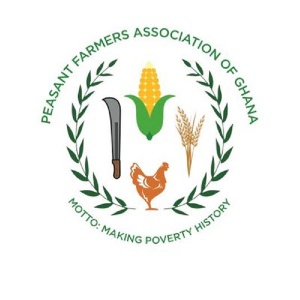The Peasant Farmers Association of Ghana (PFAG) is urging the government to dedicate part of the funds from the International Monetary Fund (IMF) programme to support agriculture sector activities.
They said prioritizing and supporting the sector with the needed funding would boost food production, enhance agro processing and turn around the fortunes of the economy.
Mr. Wepia Addo Awal Adugwala, the President of PFAG, made the call at the opening of the 3rd National Policy on Agroecology forum in Accra to identify strategic policy directions and reform areas that are fundamental to accelerating and sustaining national food security.
The European Union and French Development
Agency funded project is seeking to strengthen livelihoods and building assets for farmers especially among small holder farmers, catalyze equitable growth by deepening and scaling agroecological practices.
The event was organised by the Ministry of Food and Agriculture, under the ECOWAS Agroecology Program in West Africa (PAE) that aims at supporting agro ecological transition that reconciles economic performance, food security and strengthening of resilience.
Mr Adugwala said in the midst of climate change impacts, economic difficulties and the surge in price of chemical fertilizer, the best alternative for the government to invest in to revitalise the economy was agroecology farming practices.
He described agroecology as a farming technology involving traditional practices that built up the soil to retain more nutrients and storage water to support plant growth.
“Due to the high cost of input, especially fertilizer,
the expenses of an acre of maize averagely increased from GHS1700 in 2021 to GHS 5000 in 2022,” he said.
Mr Kingsley Kwasi Agyemang, the National Correspondent of the ECOWAS Agroecology in Ghana, said the adoption of agroecology practices, could help ensure sustainable food production in order to feed the growing population.
He noted that It was one of the surest avenues to address the challenges of natural resource degradation, biodiversity loss and impact of climate change, including pest and diseases, erratic rainfall, flooding and drought.
Mr Agyemang, who is also a Climate Change Expert at the Ministry of Food and Agriculture, said agroecology method of farming was gaining acceptance as a science and a social movement which promoted healthy, culturally appropriate and sustainable food production.
He stated that the ECOWAS Commission and the government were collaborating to implement an
initiative called ECOWAS Agroecology Programme to support farms in an agroecological transition to ensure food security, build resilience and protect nature.
Dr. Solomon Gyan Ansah, the Director of Crop Services at MoFA, said the government was finalizing an enhanced version of Planting for Food and Jobs to help access inputs at a reduced cost.
He stated that the programme would see a change from subsidy to input credit system thereby lowering the entry barrier to agriculture.
“Prices of inputs and machinery constitute about 85 per cent of the total cost of production of a farmer. The previous subsidy programme was only taking care of 15 per cent of the total cost of production,” he said.
Participants were drawn from the Ministry of Food and Agriculture, Departments of Agriculture, Environmental Protection Agency, Council for Scientific and Industrial Research, Centre for No-Till Agriculture, Ghana Agricultural Sector Investment
Programme, Peasant Farmers Association of Ghana, Centre for Indigenous Knowledge and Organisational Development, and journalists.
Business News of Sunday, 18 June 2023
Source: GNA













